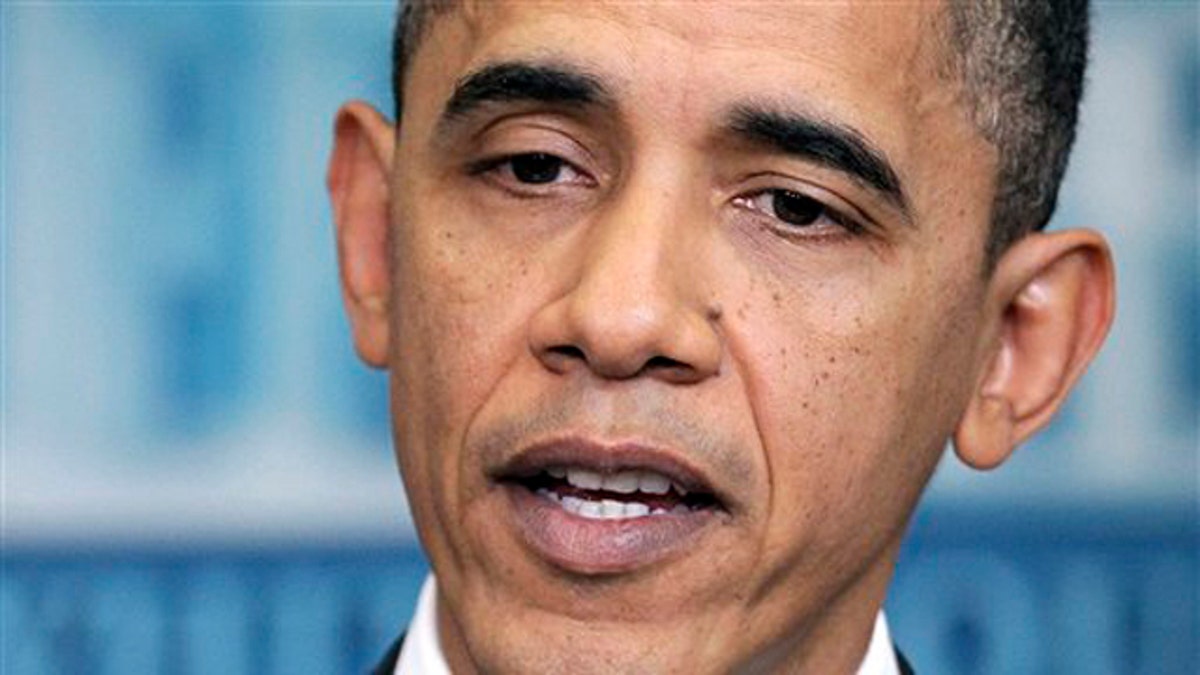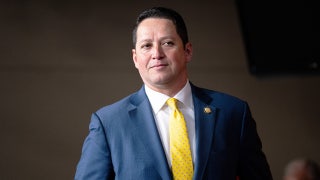
Dec. 7: President Obama answers a question during a news conference in the White House briefing room. (AP)
President Obama urged Democratic lawmakers Tuesday to get behind a controversial plan to extend the Bush tax cuts for all Americans, saying he understands their desire for a "fight" with Republicans but that he's not willing to risk middle-class taxpayers being harmed in the process.
The president, calling his 10th solo news conference to discuss his proposal, defended as a "good deal" the compromise he struck with Republican lawmakers. Directing his message largely toward the grumbling Democratic caucus, he likened their complaints to those expressed during the health care debate and scolded them for their stubbornness.
"This is the public-option debate all over again," Obama said from the press briefing room. "So I pass a signature piece of legislation, where we finally get health care for all Americans, something that Democrats have been fighting for for a hundred years, but because there was a provision in there that they didn't get ... that somehow that was a sign of weakness and compromise."
But trying to soothe his party is a little like a congressman walking into a rowdy town hall meeting with constituents. Nearly a year after the health care debates, lawmakers across Capitol Hill are once again blasting the president over a proposed compromise, this time to extend the Bush tax cuts for two years for all taxpayers -- as well as extend long-term jobless benefits for one year.
Obama assured Democrats Tuesday that he remains opposed to extending tax cuts for the wealthy but said he had to accept a temporary extension because Republicans were "unwilling to budge" on it. He said he would push to end those cuts two years from now, but urged Congress to support the plan to avoid a crushing tax increase at the beginning of next year.
"I'm not here to play games with the American people or the health of our economy," Obama said.
"I've said before that I felt that the middle-class tax cuts were being held hostage to the high-end tax cuts. I think it's tempting not to negotiate with hostage takers, unless the hostage gets harmed. Then, people will question the wisdom of that strategy. In this case, the hostage was the American people. And I was not willing to see them get harmed," he said.
But liberal Democrats in the House and Senate didn't see it that way.
But Sen. Frank Lautenberg, D-N.J., told Fox News that release of the hostages -- which he described as unemployment insurance for those who need to keep themselves going in exchange for a $100,00 tax cut for someone who makes $1 million -- was too "heavy a price."
"I don't like what I see, because it looks like a ransom was paid with a let-them-eat-cake attitude," he said.
The fallout from Obama's announcement Monday evening signals that the heavy lifting is not over yet. Congress has until Dec. 31 to avert a sweeping hike on all taxpaying Americans, and the negotiators still have a lot of convincing to do.
Obama disputed allegations Tuesday that his administration was caving to the GOP's demands while acknowledging the frustration in his party. "I understand the desire for a fight. I'm sympathetic to that," he said. "I could have enjoyed the battle with Republicans over the next year or two."
But he said with taxpayers being held hostage, he did not want to wage a "protracted political battle."
As Obama spoke, Vice President Biden held a lunch meeting with Senate Democrats disenchanted with the administration over the product of the negotiations.
"I'm opposed" to the deal, said Sen. Mark Udall, D-Colo, adding that he sees a plan that's "unbalanced when it comes to helping the middle class."
Sen. Mary Landrieu, D-La, who is adamantly opposed to the compromise, called tax cuts for the wealthy "morally unconscionable."
Other senators are reserving judgment, including Sens. Byron Dorgan, D-N.D.; Barbara Mikulski, D-Md.; and Ron Wyden, D-Ore.
Whatever coalition opposes this package will likely end up being a mix of conservative Republicans and liberal Democrats both disappointed over the ground given to the other side.
While the liberal wing of Obama's party was howling over his decision to negotiate with Republicans -- likened to "terrorists" by one Democratic senator last week -- conservatives also were grumbling that the president won concessions for Democrats in the process.
Though Senate Republican Leader Mitch McConnell said Tuesday that most members of his caucus would support the package, some conservative members have expressed concern about the extension of long-term jobless aid, which was set at 99 weeks until it started to phase out last month.
Rep. Michele Bachmann, R-Minn., in an interview Monday on Sean Hannity's radio show shortly before the deal was announced, said that she's not sure Republicans would support a package that includes the aid extension alongside the tax cuts.
"That'd be a very hard vote to take," Bachmann said, urging lawmakers to divorce the two issues. "I think, again, we're back in a conundrum."
She backed off her criticism slightly on Tuesday, saying that despite her concerns about the aid extension the compromise "will at least offer a foundation for job creation."
The conservative Club for Growth slammed the deal Tuesday as "bad policy, bad politics" which would blow a hole in the deficit.
Rep. Jeb Hensarling, R-Texas, told Fox News the tax cut extension is vital but criticized the jobless benefits and said they should at least be paid for. "We want to make sure we're dealing more with paychecks and not so focused on unemployment checks," he said Tuesday, noting that he needs to review the deal more closely.
"I'm not initially thrilled about it, and that's perhaps is what a successful negotiation is all about," he said.
On the other side, Vermont Sen. Bernie Sanders, an independent who caucuses with the Democrats, threatened to filibuster, calling the deal "absolutely wrong" in an interview with MSNBC.
Obama accurately predicted that the proposal would be met with sound and fury. "I have no doubt that everyone will find something in this compromise that they don't like," he said Monday.
But he said he's not willing to let ordinary Americans become "collateral damage for political warfare in Washington."
Under the proposal, the Bush tax cuts would be extended for two years for all income tax brackets. Long-term jobless aid would be extended through next year so that people who are entitled to 99 weeks now will continue to receive aid. The estate tax rate would be renewed only at a lower rate than the 55 percent it was before the Bush-era cuts. And instead of pushing for an extension of the stimulus act's income tax cut, the administration wants a one-year payroll tax reduction that would cut the Social Security contribution paid by workers from 6.2 percent to 4.2 percent.
A meeting of House Democrats is set for Tuesday evening.










































